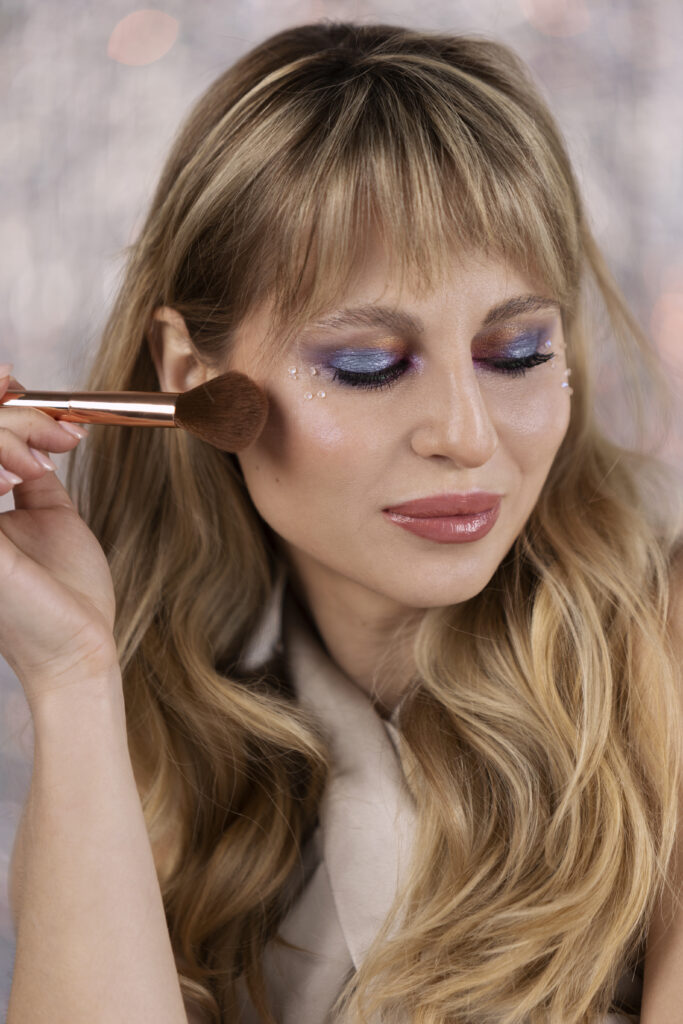Finding the right foundation can feel overwhelming, but don’t worry! This guide will help you pick the perfect foundation for your skin type and needs. Let’s break it down step-by-step.
Understanding Your Skin Type
First things first—know your skin type. This will help you choose a foundation that works best for you. Here’s a quick overview:
- Normal Skin: Balanced and smooth. Most foundation types will suit you.
- Oily Skin: Shiny in the T-zone (forehead, nose, chin) and prone to breakouts. Look for oil-free and mattifying formulas.
- Dry Skin: Flaky or tight. Choose hydrating foundations that won’t emphasize dryness.
- Combination Skin: Oily in some areas and dry in others. Opt for versatile foundations that balance these differences.
- Sensitive Skin: Prone to redness or irritation. Look for gentle, hypoallergenic foundations.
Choosing the Right Foundation Formula
Different foundation formulas suit different skin types. Here’s a guide to help you pick the right one:
1. Liquid Foundation
Best for: Most skin types, especially normal to dry.
Description: Liquid foundations offer various finishes—matte, dewy, and satin—and can be built up from light to full coverage.
Pros:
- Versatile with different finishes and coverage levels.
- Blends easily for a natural look.
Cons:
- Might need powder to set on oily skin.
- Can highlight dryness if your skin isn’t properly moisturized.
Tips:
- For dry skin: Go for hydrating or dewy formulas.
- For oily skin: Choose oil-free or mattifying options.
2. Powder Foundation
Best for: Oily and combination skin.
Description: Powder foundations can be pressed or loose, providing a matte finish that controls oil.
Pros:
- Lightweight and easy to apply.
- Controls shine and oil throughout the day.
Cons:
- Can highlight dry patches on dry skin.
Tips:
- For oily skin: Pick powders that absorb oil.
- For dry skin: Look for powders with added moisture or use sparingly.
3. Cream Foundation
Best for: Dry and normal skin.
Description: Cream foundations are thick and provide full coverage, ideal for hydrating the skin.
Pros:
- Offers full coverage with a creamy texture.
- Good for covering imperfections.
Cons:
- Can feel heavy on oily skin.
- May need setting with powder.
Tips:
- For dry skin: Choose moisturizing, creamy foundations.
- For oily skin: Use a mattifying primer and set with powder.
4. Stick Foundation
Best for: All skin types, depending on the formula.
Description: Stick foundations are compact and offer medium to full coverage.
Pros:
- Portable and easy to apply.
- Good for spot concealing.
Cons:
- Can be heavy for some skin types.
Tips:
- For dry skin: Opt for a moisturizing stick foundation.
- For oily skin: Choose a matte stick foundation.
5. Tinted Moisturizer
Best for: Normal to dry skin.
Description: Tinted moisturizers provide light coverage and extra hydration for a natural look.
Pros:
- Gives a dewy finish with added moisture.
- Often includes SPF for sun protection.
Cons:
- Limited coverage for significant blemishes.
Tips:
- For dry skin: Look for hydrating formulas.
- For oily skin: Find oil-free or mattifying options.
Finding the Right Shade
Getting the right shade is key to a natural look. Here’s how to find your perfect match:
1. Determine Your Undertone
Your undertone helps you pick a foundation that blends well. Here are the main types:
- Cool: Pink, red, or blue undertones. Choose a pink or red base.
- Warm: Yellow, golden, or peach undertones. Opt for a yellow or golden base.
- Neutral: A mix of both. Look for foundations labeled as neutral.
2. Test Shades
Test foundation shades on your jawline or neck to see how they blend with your skin.
3. Check in Natural Light
Always check your foundation in natural light to ensure it matches your skin.
4. Consider Seasonal Changes
Your skin tone might change with the seasons. Have different shades for summer and winter, or mix shades to match your skin year-round.
Adapting Foundation for Specific Needs
Your skincare concerns should guide your foundation choice. Here’s how to adjust:
1. For Acne-Prone Skin
Choose non-comedogenic foundations that won’t clog pores. Some have acne-fighting ingredients like salicylic acid.
2. For Sensitive Skin
Opt for hypoallergenic, fragrance-free foundations. Mineral foundations are often gentler.
3. For Mature Skin
Look for hydrating foundations with a dewy finish. Foundations with light-reflecting properties can help reduce the appearance of fine lines.
4. For Rosacea or Redness
Use foundations with green-tinted bases to neutralize redness. Choose buildable coverage to address discoloration.
5. For Hyperpigmentation
Choose full-coverage or color-correcting foundations to address dark spots. Yellow or peach tones can balance discoloration.
Applying Foundation for a Flawless Finish
Here’s how to apply foundation for the best results:
1. Prep Your Skin
Start with a clean, moisturized face. Apply a primer suited to your skin type to create a smooth base.
2. Use the Right Tools
Apply foundation with brushes, sponges, or fingers. Brushes give a polished look, sponges offer a dewy finish, and fingers help with blending.
3. Apply in Layers
Start with a small amount of foundation and build coverage as needed. Light layers blend better and avoid a cakey appearance.
4. Blend Well
Blend foundation into your hairline, jawline, and neck to avoid visible lines. Make sure there are no harsh edges.
5. Set Your Foundation
Use a translucent powder or setting spray to lock in your foundation and reduce shine. This helps keep your makeup in place all day.
Conclusion
Finding the right foundation is all about understanding your skin type, selecting the right formula, and choosing the perfect shade. Follow these tips to find a foundation that enhances your natural beauty and provides a flawless base for your makeup. The right foundation not only matches your skin tone but also works with your skin’s unique needs. Enjoy discovering your perfect foundation and the confidence it brings!





